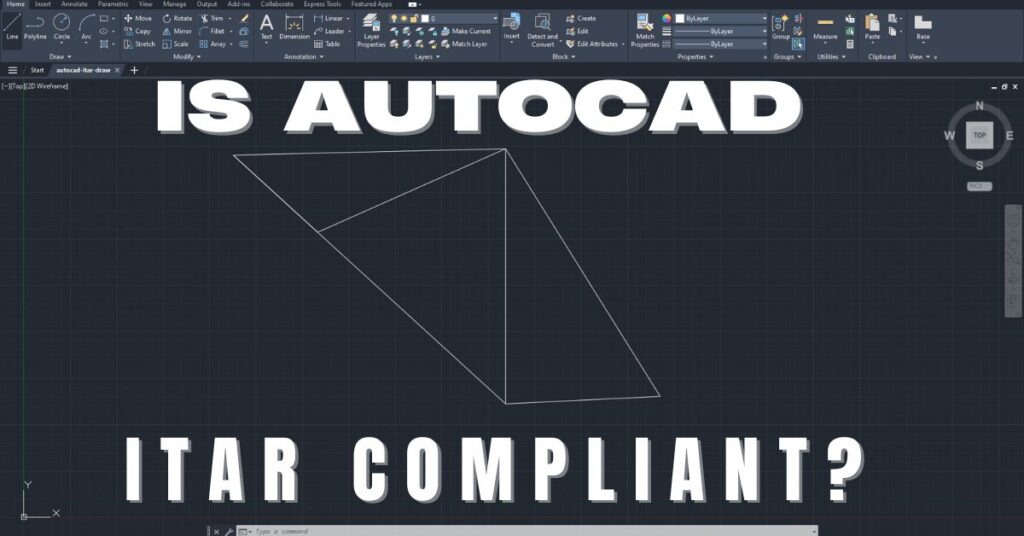Licensing plays a pivotal role under ITAR in regulating export and import of defense articles, defense services, and associated technical data. While there are many ITAR-regulated activities, temporary importation and exportation of defense items are likely to occur more frequently. Thus, understanding DSP-61 and DSP-73 licenses is crucial for companies dealing with U.S. defense articles. These licenses are part of a larger framework for regulating and controling the export and import of defense products and services. This framework ensures safrugarding of sensitive military and defense technologies and reaches only the right hands. This article aims to demystify the complexities surrounding these licenses, making it easier for businesses to navigate the intricate world of defense trade regulations.
What is ITAR and Defense Export Control?
The International Traffic in Arms Regulations, commonly known as ITAR, is a set of U.S. government regulations that control the export and import of defense articles and services. These rules are essential for maintaining national security and foreign policy objectives. ITAR specifies that companies must be licensed to export defense-related technologies, ensuring that these items are not transferred to unauthorized entities. The Directorate of Defense Trade Controls (DDTC) in the Bureau of Political-Military Affairs at the U.S. Department of State implements the ITAR, including the United States Munitions List (USML). The DDTC plays various roles in the U.S. Defense Articles regulation, including:
Oversight and Licensing
The DDTC oversees the implementation of the ITAR, a critical regulation governing the export and import of defense services and articles listed on the USML. It is responsible for reviewing license applications for defense articles and services, assessing potential risks, and making rational decisions on approvals or denials. This includes licenses for both permanent and temporary exports and imports. DDTC also provides guidance and interpretations to industry and government agencies on the relevant sections of the ITAR. DDTC publishes annual reports, notices, announcements, and other documentation detailing its activities and announcing policy decisions to ensure transparency in its oversight functions. Moreover, it conducts investigations and audits to ensure that exporters and importers of ITAR-controlled items abide by the regulation.
Regulatory Compliance
The DDTC ensures that businesses comply with ITAR regulations, helping to prevent sensitive technology from reaching the wrong hands. To this end, it strongly encourages registered exporters, manufacturers, brokers, and others engaging in defense trade to maintain ITAR compliance programs. These programs assist in monitoring and controlling exports and other regulated activities. DDTC also issues ITAR Compliance Program Guidelines to provide substantive summary guidance related to the DDTC registration requirement under the ITAR, jurisdiction and classification, authorizations, and other approvals. The Agency also maintains a list of Debarred or restricted parties. Companies planning to engage in ITAR-controlled activities must conduct a denied party screening to ensure transactions DO NOT include entities on the U.S. government sanctions lists or with known proliferation risks.
Advisory Role
The to companies on how to comply with ITAR regulations, ensuring that all defense trade activities are conducted legally and ethically. It provides resources like online training modules, workshops, and seminars to educate exporters and importers on their compliance obligations. DDTC also actively engages with industry associations and individual companies through company visit programs to understand their challenges and concerns. This allows them to tailor their compliance programs effectively.
Monitoring and Enforcement
The DDTC actively monitors the defense trade industry and enforces ITAR regulations. This can be through scheduled and unscheduled audits of registered exporters and manufacturers. In these audits, the DDTC reviews documentation, interviews personnel, and assesses internal control systems to identify potential violations or weaknesses. However, the DDTC encourages companies to self-disclose potential violations and cooperate with investigations. This program allows for early detection and remediation of issues, potentially mitigating penalties. If it discovers violations, the DDTC can take various enforcement actions, including issuing warnings, imposing fines, revoking licenses, or pursuing criminal charges.
International Cooperation
The DDTC works with international partners to control the global movement of defense articles, collaborating on international security and defense trade regulation matters. Such collaborations include sharing intelligence and information about illegal arms transfers, suspicious activities, and emerging threats. This is critical in ensuring the non-proliferation of weapons and global peace and stability.
DSP-61 License: The Temporary Import License
The DSP-61 License allows companies in the United States to import defense articles temporarily. This is especially useful when these items are needed for exhibitions, demonstrations, or repairs. The main goal is to permit the temporary entry of military goods without the intention of staying in the U.S. permanently.
Scope and Limitations of the DSP-61 License
- Temporary Use: The DSP-61 is strictly for items entering the U.S. temporarily.
- Non-Transferable: Items imported under this license cannot be sold or transferred within the U.S.
- Time-Bound: There is a set time limit for how long the items can stay in the U.S.
- Limited to Defense Articles: This license only covers unclassified military or defense items.
- Category: You can only use DSP-61 to temporarily import UNCLASSIFIED defense articles and hardware. If the temporary import is for classified articles, a DSP-85 must be submitted.
Process and Requirements for Obtaining a DSP-61 License
Any entity looking to engage in ITAR-controlled activities must first register with the DDTC. Therefore, to submit a DSP-61, your company must be registered with DDTC, and the empowered official must sign the application. DSP-61 license application follows the process described below:
- Application: Submit an application to the Directorate of Defense Trade Controls.
- Documentation: Provide detailed information about the articles, including purpose and duration of import.
- Compliance: Ensure all items comply with ITAR regulations.
- Approval Process: Wait for the DDTC to review and approve the application.
If a DSP-61 has already been submitted and updates are needed, it can be amended by completing and submitting form DSP-62. DDTC can make three choices regarding the initial license application and subsequent amendments: Approval, Denial, or Return Without Action (RWA). If your application is denied or Returned Without Action, review where you might have gone wrong, correct the deficiencies and resubmit it.
DSP-73 License: The Temporary Export License
The DSP-73 License is for temporarily exporting defense articles out of the United States. DSP-73 is used when these items must be taken to foreign locations for demonstrations, training, or repairs abroad. However, the license is valid only if the article will be exported for less than 4 years and will be returned to the U.S. Transfer of title will not occur during the period of temporary export. If the article is to remain outside the U.S. beyond the period for which the license is valid, the temporary exporter must renew the license or get another written approval from the DDTC.
Scope and Limitations of the DSP-73 License
- Technical Data: Technical data cannot be exported using a DSP-73 license because the export of technical data is permanent. However, software loaded on a computer, manuals, or operating instructions for demonstration are exempted.
- Temporary Use: The DSP-73 is strictly for unclassified defense items that are temporarily leaving the U.S. for a specific reason. Such reasons include repair and/or replacement, test equipment/testing and “fit-checks,” demonstration or marketing, and Trade shows.
- Geographic Limitation: Items exported under this license should be limited to one geographic region (Europe, Africa, Middle East, South America, etc.).
- Category: Like in DSP-61, DSP-73 can only be used for temporarily exporting UNCLASSIFIED defense articles and hardware. If the temporary export is CLASSIFIED, you should submit a DSP-85 application.
Process and Requirements for Obtaining a DSP-73 License
To obtain a DSP-73 License, you also must have registered with the DDTC. If you haven’t, take the necessary measures to register. Additionally, the Company’s empowered official MUST sign the application. However, obtaining a DSP-73 license generally follows the following steps:
- Application Submission: Apply to the Directorate of Defense Trade Controls.
- Detailing the Export: Provide specifics about what is being exported, its purpose, and the time frame.
- Submitting Documentation: Supporting documentation must be submitted with the initial application.
- ITAR Compliance: Ensure that the export complies with ITAR rules.
- Await Approval: The application undergoes a review process by the DDTC.
Regarding your initial application, the DDTC can approve, deny, or return your license application without action (RWA). This also applies to any amendments you made to the initial license. If your application is denied or Returned Without Action, review it, correct the issues, and resubmit it. However, you might have submitted a DSP 73 license application and realized it needs some updates. These amendments can be made by completing and submitting form DSP 74. Regardless, ensure you make all the exits and entries of hardware and articles when the license is VALID.
The Significance of DSP Temporary Licenses in U.S. Defense Articles
DSP-61 and DSP-73 licenses are critical tools in managing U.S. defense exports and imports. They ensure that the transfer of military and defense-related items happens safely and legally. This is crucial for national security and international relationships.
Role of DSP-61 and DSP-73 Licenses in U.S. Defense Exports
- Control and Security: These licenses control who gets U.S. defense items and for what purpose. They help prevent these items from reaching the wrong hands. This helps in preventing the proliferation of military technologies.
- Regulatory Compliance: Businesses must follow these rules to stay legal. This helps the U.S. follow its own laws and international agreements.
- International Trust: By regulating exports, the U.S. shows it’s responsible in the global arms trade. These licenses enable activities that strengthen U.S. alliances, promote U.S. defense exports, and contribute to international security frameworks. This builds trust with other countries.
- Minimize potential misuse: Strict regulations and application processes associated with these licenses aim to prevent unauthorized diversions or use of defense articles for unintended purposes.
Examples of DSP Temporary License Applications
- DSP-61 for Training: A U.S. company temporarily imports foreign military equipment for training purposes. They use a DSP-61 license to legally bring these items into the U.S. and return them after the training.
- DSP-73 for Repairs: Another company needs to send U.S. defense articles overseas for repairs. They obtain a DSP-73 license, ensuring they can export, repair, and re-import these items within the legal framework.
- DSP-61 for Exhibitions: A defense manufacturer uses a DSP-61 license to temporarily import a high-tech defense system for a defense trade show in the U.S. After the show, the equipment is returned to its country of origin.
- DSP 61 for Transhipment: A company exporting defense articles to a third country through the U.S. has to apply for and obtain a DSP-61 license. However, DSP-61 licenses issued for the purposes of 22 CFR 123.3(a)(2) are authorized for single entry and exit.
- DSP-73 for Testing and “fit-checks”: A defense manufacturer looking to test its hardware performance in various geographical regions has to obtain a DSP-73 license. This allows such manufacturers to develop articles that can perform in various environments or regions, giving our military a battleground advantage.
Export Control Regulations
Export control regulations are rules set by a country to manage the export of goods, technology, and services for reasons like national security, foreign policy, and trade protection. These regulations are crucial in the defense sector, where the export of military and strategic items is strictly controlled.
Relation to DSP Licenses
DSP licenses, including DSP-61 and DSP-73, are part of these export control regulations. They specifically deal with defense articles. Here’s how they fit into the bigger picture:
- Compliance with Laws: DSP licenses ensure that businesses comply with U.S. export control laws. Companies need these licenses to move defense-related items across borders legally.
- National Security: By controlling the export and import of defense articles, DSP licenses help protect national security. They ensure that sensitive military technology doesn’t fall into the wrong hands.
- International Agreements: These licenses also help the U.S. adhere to international agreements on arms control. By regulating exports, the U.S. demonstrates its commitment to global security standards.
- Trade Management: DSP licenses allow the U.S. to manage its defense trade. They help balance commercial interests with national and international security concerns.
Conclusion
DSP-61 and DSP-73 licenses are crucial for businesses that deal in the international defense trade. These licenses, governed by ITAR and U.S. export control regulations, ensure the legal and secure movement of defense-related items. Adherence to these regulations is vital for maintaining national security, upholding international trust, and ensuring a responsible conduct of defense trade. For companies engaged in this sector, understanding and complying with DSP-61 and DSP-73 licenses is not just a legal requirement but a contribution to global security.
Frequently Asked Questions
Yes, you can extend or renew DSP Licenses, but this requires submitting a request before the existing license expires. The process involves a review by the DDTC, which assesses the need for extension and compliance with ITAR regulations.
There are certain exemptions where you might not need DSP-61 and DSP-73 licenses, such as for specific government-to-government activities or items classified under certain exemptions in ITAR. However, understanding these exemptions requires carefully reviewing the ITAR and consultation with export control experts.
Share in Social Media
See More Case Studies

Securing Defense Contracts: A DFARS 252.204-7012 Compliance Case Study
Discover how Cleared Systems helped a Federal Contractor successfully achieve DFARS 252.204-7012 compliance by strengthening its cybersecurity posture, giving it a competitive edge when bidding for DoD Contracts.

What is GCC High? For ITAR & CMMC 2.0
Microsoft 365 Government Community Cloud (GCC) High is a specialized cloud solution tailored for U.S. federal, state, local, tribal, and territorial government organizations, as well as for contractors who hold or process data subject to specific security regulations. In this article, we will explore the features, benefits, and differences between Microsoft 365 GCC High and other Office 365 offerings.

Is AutoCAD ITAR Compliant? A Comprehensive Guide for Defense Manufacturers
Defense contractors and manufacturers working with sensitive military technologies face a critical question when selecting computer-aided design software: Is AutoCAD ITAR compliant? This question becomes

How to Get Help in Windows: Guide to Security and Compliance Support
In today’s digital landscape, ensuring your computer systems are secure and compliant with industry regulations is essential for both businesses and individuals. Windows, as one

Microsoft Copilot for GCC High: Enhancing Security and Compliance
In today’s fast-evolving digital landscape, organizations that handle sensitive data, particularly those in government sectors or defense contractors, face growing pressure to maintain strict security
Partner with Us for Compliance & Protection
We’re happy to answer any questions you may have and help you determine which of our services best fit your needs.
Your benefits:
- Client-oriented
- Security
- Compliance
- Peace of mind
- Efficiency
- Trust
What happens next?
Schedule an initial meeting
Arrange a discovery and assessment call
Tailor a proposal and solution
